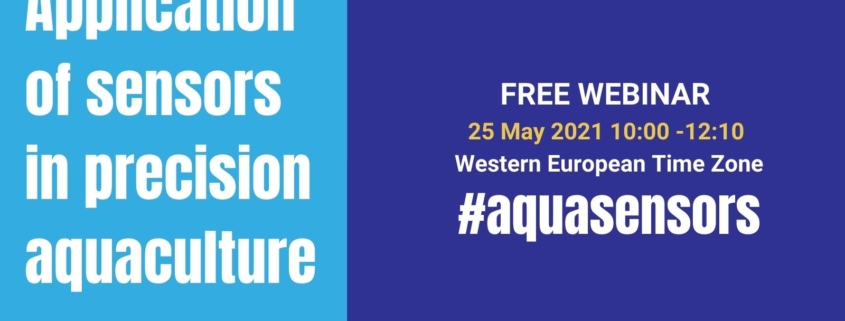Hosted by Swansea University’s Centre for Sustainable Aquatic Research (CSAR) in collaboration with the Waterford Institute of Technology on the 25th of May 2021, the webinar had 11 speakers presenting to an audience of over 150 participants from 33 countries. Below is an overview of all talks which can be downloaded. The full webinar can be watched on YouTube.
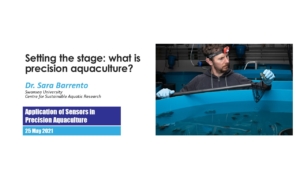 Dr Sara Barrento, marine biologist and science communicator at CSAR, introduced the topic and noted that the motivation behind precision aquaculture relates to developments in real-time sensor technologies, linked to the need for sustainable management when farms are getting bigger, moving further offshore, and aiming towards restorative aquaculture.
Dr Sara Barrento, marine biologist and science communicator at CSAR, introduced the topic and noted that the motivation behind precision aquaculture relates to developments in real-time sensor technologies, linked to the need for sustainable management when farms are getting bigger, moving further offshore, and aiming towards restorative aquaculture.
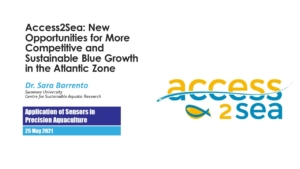
Dr Barrento also presented the Access2Sea project pilot case study on lumpfish welfare. The CSAR team is developing The Lumpfish Welfare Watcher a web-based application that will calculate the BMI (body mass index) of lumpfish and determine the proportion of fish that are emaciated, underweight, and normal, along with recommendations for action. The application will also calculate the Lumpfish Operational Welfare Score Index (LOWSI) based on four visual indicators (skin damage, eye condition, caudal fin damage and suction disc deformities), and the relative weight.
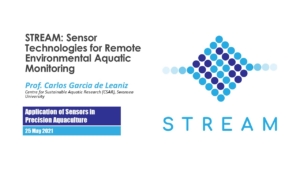 Prof. Carlos Garcia de Leaniz, director of the Centre for Sustainable Aquatic Research, Swansea University, introduced the STREAM project: Sensor Technologies for Remote Environmental Aquatic Monitoring. The project aims to monitor the Coastal and Estuarine environment around both Ireland and Wales using affordable sensors to support local coastal activities including aquaculture.
Prof. Carlos Garcia de Leaniz, director of the Centre for Sustainable Aquatic Research, Swansea University, introduced the STREAM project: Sensor Technologies for Remote Environmental Aquatic Monitoring. The project aims to monitor the Coastal and Estuarine environment around both Ireland and Wales using affordable sensors to support local coastal activities including aquaculture.
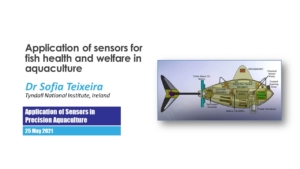 Dr Sofia Teixeira of Tyndall Institute in Ireland presented smart sensors for wellness and health in aquaculture. These sensors are non-invasive and provide rapid tests to monitor health by measuring indicators, such as cortisol and other parameters, that have wide applications in the assessment of immune competence, stress, growth, and behaviour.
Dr Sofia Teixeira of Tyndall Institute in Ireland presented smart sensors for wellness and health in aquaculture. These sensors are non-invasive and provide rapid tests to monitor health by measuring indicators, such as cortisol and other parameters, that have wide applications in the assessment of immune competence, stress, growth, and behaviour.
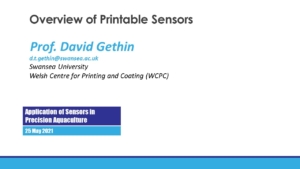 Prof. David Gethin, of the Welsh Centre for Printing and Coating (WCPC), Swansea University, gave a brief overview of commercial sensors and highlighted the benefits of printable sensors – they are less expensive and can measure a range of parameters in an integrated system. But printable sensors need to be calibrated against laboratory and commercial devices, and their durability still needs to be tested and improved. Prof. Gethin also provided an overview of printing methods and sensors being developed in the STREAM project.
Prof. David Gethin, of the Welsh Centre for Printing and Coating (WCPC), Swansea University, gave a brief overview of commercial sensors and highlighted the benefits of printable sensors – they are less expensive and can measure a range of parameters in an integrated system. But printable sensors need to be calibrated against laboratory and commercial devices, and their durability still needs to be tested and improved. Prof. Gethin also provided an overview of printing methods and sensors being developed in the STREAM project.
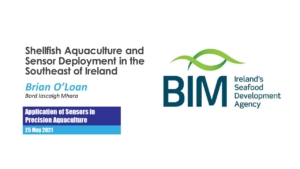
Brian O’Loan, of Bord lascaigh Mhara, gave an informative talk focusing on shellfish aquaculture and sensor deployment in the South East of Ireland. He started by pointing out the value of the shellfish aquaculture in this region and the impacts of Covid-19. The talk carried on with data from several projects showing multiple monitoring sensors deployed across three bays. Mr O’Loan concluded by pointing out that the shellfish industry needs more monitoring to protect shellfish, real-time data with notifications, and cheaper sensors capable of monitoring new parameters over greater areas.
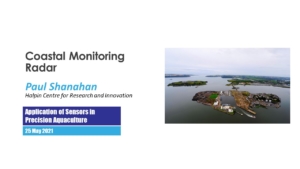 Paul Shanahan, of the National Maritime College of Ireland, highlighted the advantages of the radar system to provide accurate local weather information which can be disseminated to social media. He explained the type of radar used, its main operating characteristics, and the location of the deployment sites in Ireland. In 2022 it is expected a radar system to be deployed in Swansea, Wales.
Paul Shanahan, of the National Maritime College of Ireland, highlighted the advantages of the radar system to provide accurate local weather information which can be disseminated to social media. He explained the type of radar used, its main operating characteristics, and the location of the deployment sites in Ireland. In 2022 it is expected a radar system to be deployed in Swansea, Wales.
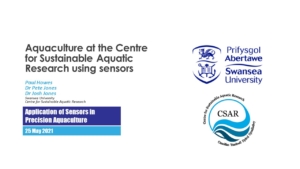 Paul Howes, Manager of the Centre for Sustainable Aquatic Research, focused on the unique facilities and projects taking place in CSAR, using a variety of species from microalgae to fish, and topics such as aquaponics and aqua biotech. Dr Pete Jones focused on experimental lab work using sensors to determining preference and avoidance thresholds for marine organisms. Dr Josh Jones focused on the mapping opportunities and challenges for aquaculture and fisheries, using relevant data from sensors.
Paul Howes, Manager of the Centre for Sustainable Aquatic Research, focused on the unique facilities and projects taking place in CSAR, using a variety of species from microalgae to fish, and topics such as aquaponics and aqua biotech. Dr Pete Jones focused on experimental lab work using sensors to determining preference and avoidance thresholds for marine organisms. Dr Josh Jones focused on the mapping opportunities and challenges for aquaculture and fisheries, using relevant data from sensors.
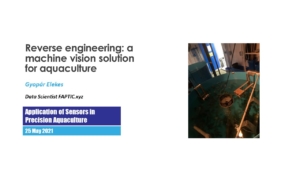 Gyopar Elekes, of faptic.xyz, focused on the use of machine vision technology that can access lumpfish clinging behaviour. The technology uses underwater cameras to record stereoscopic images, the AI and deep learning algorithms allow collecting key data which will then inform on the number of fish, define thresholds for fish density and, in the case of lumpfish, access the proportion of fish clinging and swimming.
Gyopar Elekes, of faptic.xyz, focused on the use of machine vision technology that can access lumpfish clinging behaviour. The technology uses underwater cameras to record stereoscopic images, the AI and deep learning algorithms allow collecting key data which will then inform on the number of fish, define thresholds for fish density and, in the case of lumpfish, access the proportion of fish clinging and swimming.
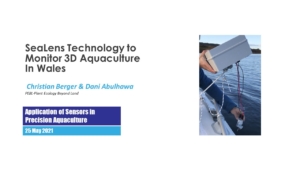 Christian Berger, of PEBL – Plant Ecology Beyond Land, focused on the importance of monitoring low trophic sea farms: the data can be used to inform on the ideal location of new aquaculture sites, create optimized harvest schedules, provide early warning and troubleshooting and validate sustainable objectives (carbon, nitrogen, biodiversity). He presented the SeaLens: a low-cost sea farm monitoring tool and a case study on a proposed seaweed and shellfish farm in Skye.
Christian Berger, of PEBL – Plant Ecology Beyond Land, focused on the importance of monitoring low trophic sea farms: the data can be used to inform on the ideal location of new aquaculture sites, create optimized harvest schedules, provide early warning and troubleshooting and validate sustainable objectives (carbon, nitrogen, biodiversity). He presented the SeaLens: a low-cost sea farm monitoring tool and a case study on a proposed seaweed and shellfish farm in Skye.
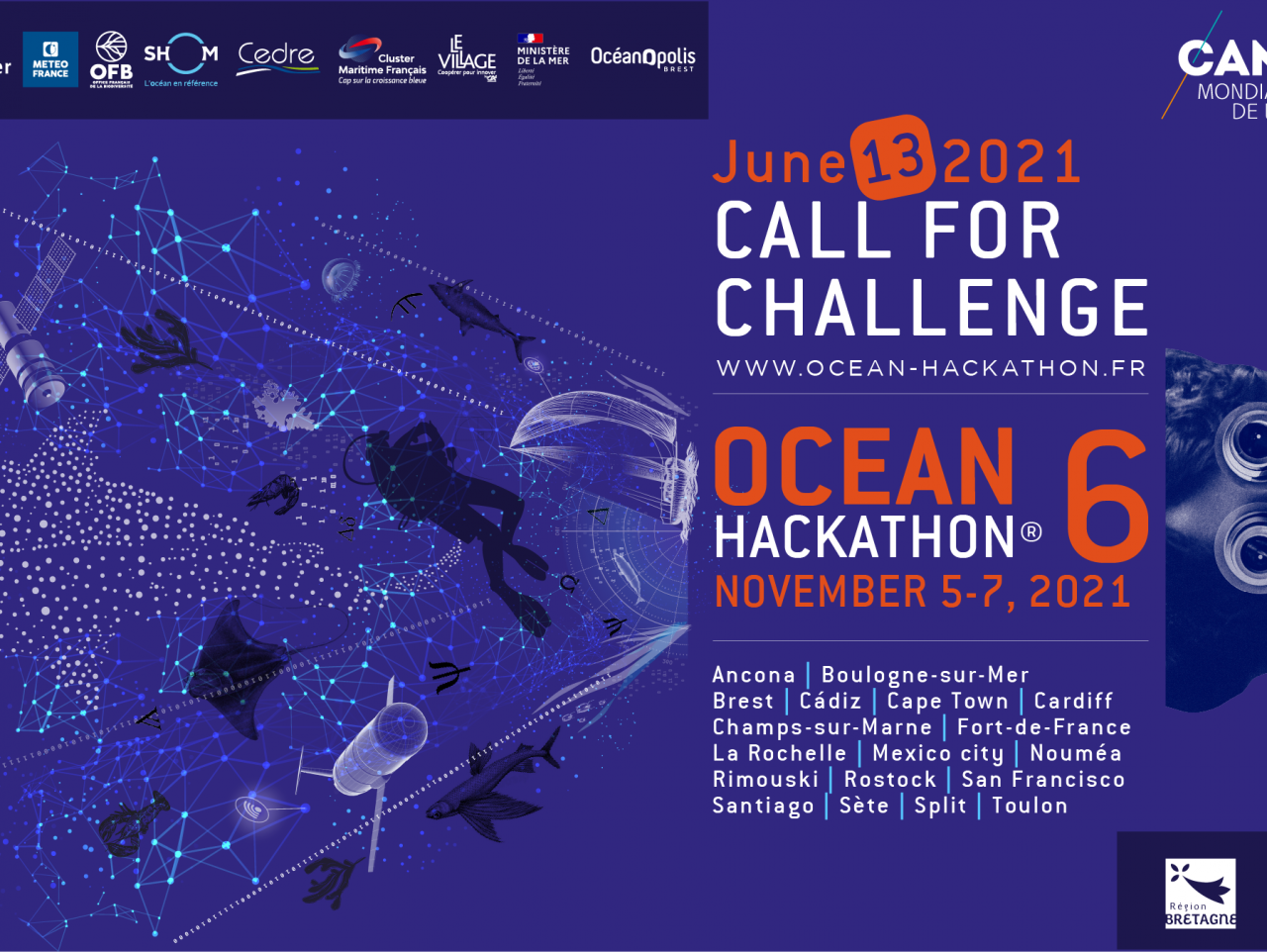



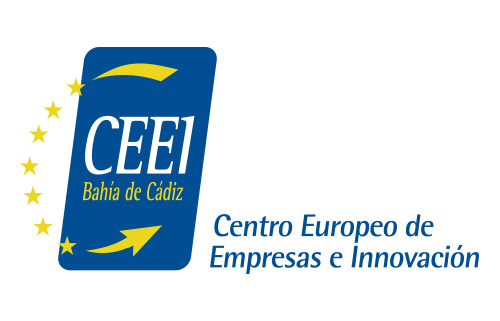
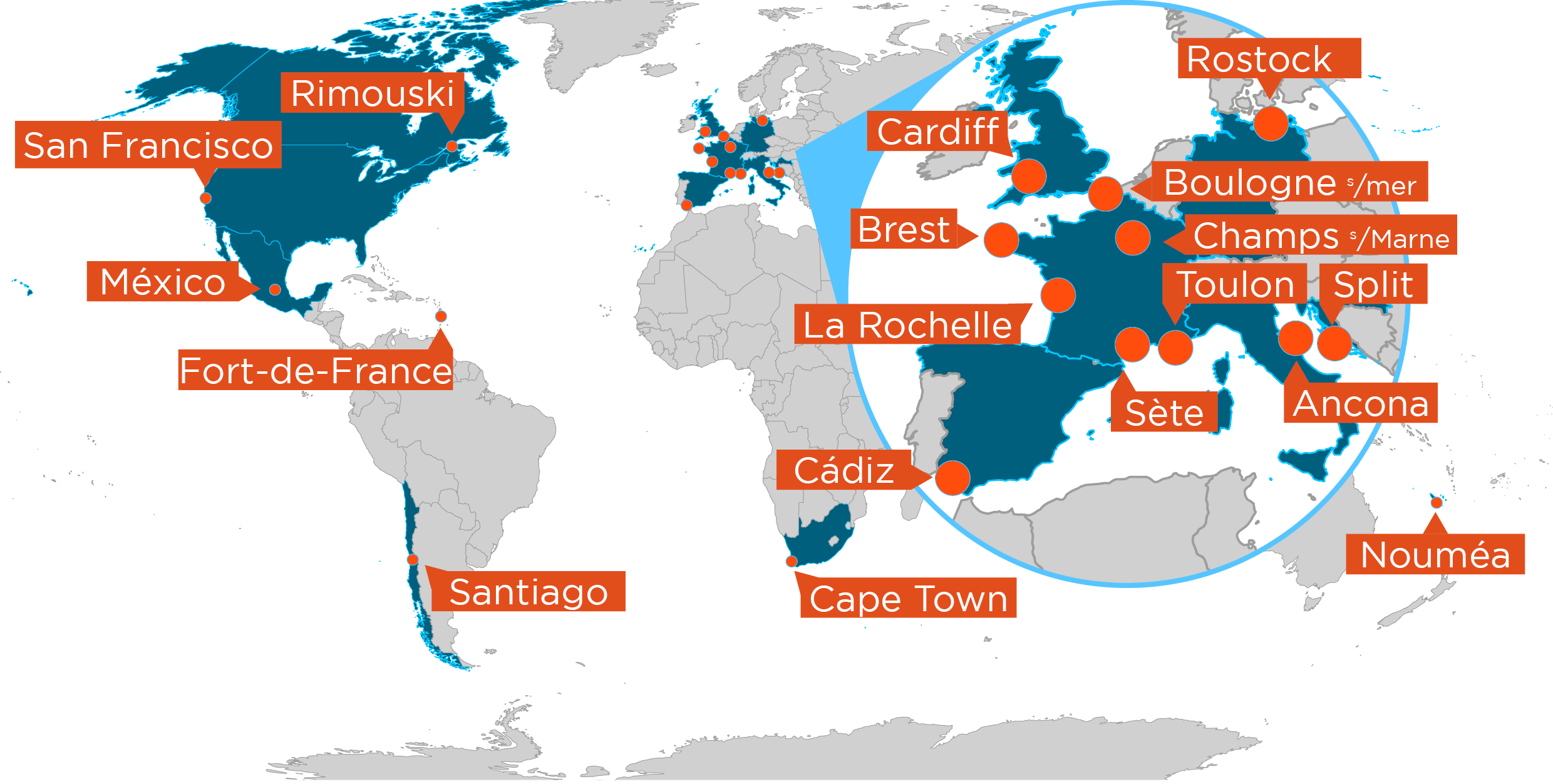

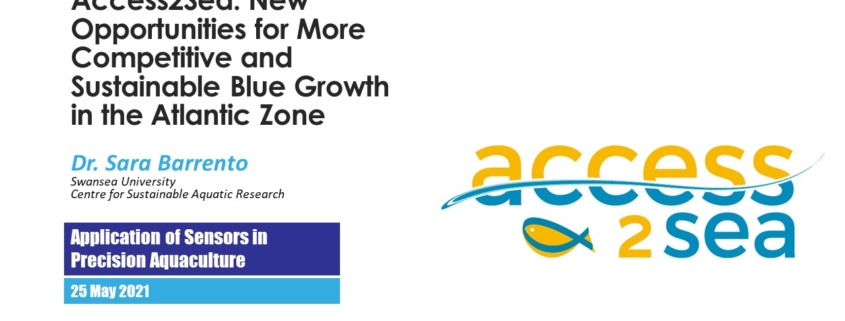
 Dr Sara Barrento, marine biologist and science communicator at CSAR, introduced the topic and noted that the motivation behind precision aquaculture relates to developments in real-time sensor technologies, linked to the need for sustainable management when farms are getting bigger, moving further offshore, and aiming towards restorative aquaculture.
Dr Sara Barrento, marine biologist and science communicator at CSAR, introduced the topic and noted that the motivation behind precision aquaculture relates to developments in real-time sensor technologies, linked to the need for sustainable management when farms are getting bigger, moving further offshore, and aiming towards restorative aquaculture.
 Prof. Carlos Garcia de Leaniz, director of the Centre for Sustainable Aquatic Research, Swansea University, introduced the STREAM project: Sensor Technologies for Remote Environmental Aquatic Monitoring. The project aims to monitor the Coastal and Estuarine environment around both Ireland and Wales using affordable sensors to support local coastal activities including aquaculture.
Prof. Carlos Garcia de Leaniz, director of the Centre for Sustainable Aquatic Research, Swansea University, introduced the STREAM project: Sensor Technologies for Remote Environmental Aquatic Monitoring. The project aims to monitor the Coastal and Estuarine environment around both Ireland and Wales using affordable sensors to support local coastal activities including aquaculture. Dr Sofia Teixeira of Tyndall Institute in Ireland presented smart sensors for wellness and health in aquaculture. These sensors are non-invasive and provide rapid tests to monitor health by measuring indicators, such as cortisol and other parameters, that have wide applications in the assessment of immune competence, stress, growth, and behaviour.
Dr Sofia Teixeira of Tyndall Institute in Ireland presented smart sensors for wellness and health in aquaculture. These sensors are non-invasive and provide rapid tests to monitor health by measuring indicators, such as cortisol and other parameters, that have wide applications in the assessment of immune competence, stress, growth, and behaviour. Prof. David Gethin, of the Welsh Centre for Printing and Coating (WCPC), Swansea University, gave a brief overview of commercial sensors and highlighted the benefits of printable sensors – they are less expensive and can measure a range of parameters in an integrated system. But printable sensors need to be calibrated against laboratory and commercial devices, and their durability still needs to be tested and improved. Prof. Gethin also provided an overview of printing methods and sensors being developed in the STREAM project.
Prof. David Gethin, of the Welsh Centre for Printing and Coating (WCPC), Swansea University, gave a brief overview of commercial sensors and highlighted the benefits of printable sensors – they are less expensive and can measure a range of parameters in an integrated system. But printable sensors need to be calibrated against laboratory and commercial devices, and their durability still needs to be tested and improved. Prof. Gethin also provided an overview of printing methods and sensors being developed in the STREAM project.
 Paul Shanahan, of the National Maritime College of Ireland, highlighted the advantages of the radar system to provide accurate local weather information which can be disseminated to social media. He explained the type of radar used, its main operating characteristics, and the location of the deployment sites in Ireland. In 2022 it is expected a radar system to be deployed in Swansea, Wales.
Paul Shanahan, of the National Maritime College of Ireland, highlighted the advantages of the radar system to provide accurate local weather information which can be disseminated to social media. He explained the type of radar used, its main operating characteristics, and the location of the deployment sites in Ireland. In 2022 it is expected a radar system to be deployed in Swansea, Wales. Paul Howes, Manager of the Centre for Sustainable Aquatic Research, focused on the unique facilities and projects taking place in CSAR, using a variety of species from microalgae to fish, and topics such as aquaponics and aqua biotech. Dr Pete Jones focused on experimental lab work using sensors to determining preference and avoidance thresholds for marine organisms. Dr Josh Jones focused on the mapping opportunities and challenges for aquaculture and fisheries, using relevant data from sensors.
Paul Howes, Manager of the Centre for Sustainable Aquatic Research, focused on the unique facilities and projects taking place in CSAR, using a variety of species from microalgae to fish, and topics such as aquaponics and aqua biotech. Dr Pete Jones focused on experimental lab work using sensors to determining preference and avoidance thresholds for marine organisms. Dr Josh Jones focused on the mapping opportunities and challenges for aquaculture and fisheries, using relevant data from sensors. Gyopar Elekes, of faptic.xyz, focused on the use of machine vision technology that can access lumpfish clinging behaviour. The technology uses underwater cameras to record stereoscopic images, the AI and deep learning algorithms allow collecting key data which will then inform on the number of fish, define thresholds for fish density and, in the case of lumpfish, access the proportion of fish clinging and swimming.
Gyopar Elekes, of faptic.xyz, focused on the use of machine vision technology that can access lumpfish clinging behaviour. The technology uses underwater cameras to record stereoscopic images, the AI and deep learning algorithms allow collecting key data which will then inform on the number of fish, define thresholds for fish density and, in the case of lumpfish, access the proportion of fish clinging and swimming. Christian Berger, of PEBL – Plant Ecology Beyond Land, focused on the importance of monitoring low trophic sea farms: the data can be used to inform on the ideal location of new aquaculture sites, create optimized harvest schedules, provide early warning and troubleshooting and validate sustainable objectives (carbon, nitrogen, biodiversity). He presented the SeaLens: a low-cost sea farm monitoring tool and a case study on a proposed seaweed and shellfish farm in Skye.
Christian Berger, of PEBL – Plant Ecology Beyond Land, focused on the importance of monitoring low trophic sea farms: the data can be used to inform on the ideal location of new aquaculture sites, create optimized harvest schedules, provide early warning and troubleshooting and validate sustainable objectives (carbon, nitrogen, biodiversity). He presented the SeaLens: a low-cost sea farm monitoring tool and a case study on a proposed seaweed and shellfish farm in Skye.